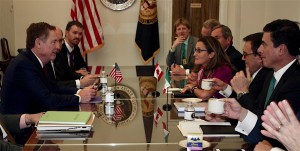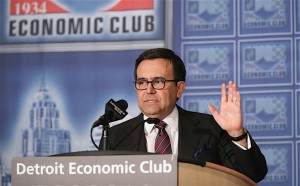
U.S. Trade Representative Robert Lighthizer, left, talks with Canada's Chrystia Freelander and Mexico's Ildefonso Guajardo, both right.
The United States is not looking to make a few tweaks to the North American Free Trade Agreement, but instead wholesale changes, said U.S. Trade Representative Robert Lighthizer in his speech kicking off the negotiations.
While his counterparts from Canada and Mexico offered more conciliatory messages in their opening remarks, Lighthizer doubled down on his contention that the agreement hasn’t brought the same level of economic prosperity to the U.S. as it has Mexico and Canada.
“(F)or countless Americans, this agreement has failed,” he said during the remarks that were part of the first of what will be several sets of negotiations through the rest of the year to remake the 23-year-old trade pact.
“We cannot ignore the huge trade deficits, the lost manufacturing jobs, the businesses that have closed or moved because of incentives – intended or not – in the current agreement.”
(Automakers wary of Trump’s plans for NAFTA talks. Click Here for the story.)
Although he admitted the deal has been helpful to American farmers and ranchers, it has been devastating for manufacturing in the U.S.

Mexico's top trade official Ildefonso Guajardo told the Detroit Economic Club that any renegotiation of NAFTA must benefit all the parties.
Lighthizer said at least 700,000 Americans have lost their jobs due to NAFTA, adding the number could be “much, much bigger than that.” He also said that the trade imbalance between Mexico and the U.S. was basically nil. However, since 1993, the U.S. trade deficit with Mexico has grown steadily. Last year, it was $57 billion, and there is currently a $68 billion deficit in the auto sector.
“Thousands of American factory workers have lost their jobs because of these provisions,” he said.
He was a little less damning in his discussion of trade with Canada, saying there has been some improvement in the trade balance, but during the last 10 years, the deficit exceeds $365 billion.
Lighthizer has consistently maintained that significant changes must be made to the agreement. Those changes were a pivotal part of President Donald Trump’s campaign rhetoric with Trump even suggesting that the U.S. might pull out of the deal all together.
“The views of the President about NAFTA, which I completely share, are well known,” Lighthizer said. “We feel that NAFTA has fundamentally failed many, many Americans and needs major improvement.”
(Click Here for more about process of renegotiating NAFTA.)
Canadian officials have been relatively quiet during the repeated moves by Trump trade officials to criticize the agreement, Mexico’s trade contingent has been pretty forthright about its feelings, including telling the Trump administration that the much-discussed border tax would be a deal breaker and that significant changes in the rules of origin would likely doom the discussions.
That last point didn’t stop Lighthizer from putting that near the top of his list of priorities for the talks.
“Rules of origin, particularly on autos and auto parts, must require higher NAFTA content and substantial U.S. content. Country of origin should be verified, not ‘deemed,’” he said.
His top priority was to lower the trade imbalances between the countries, particularly Mexico, to make them much closer to even. The rule of origin was second on his list of changes.
Additionally, he wants stronger labor provisions, rules to prevent currency manipulation, dispute-settlement tools that “respect” U.S. sovereignty, safeguards against product dumping by third-world countries or state-controlled enterprises, and provisions to ensure flexibility to revise the agreement as the world and its economy changes.
Despite the less forward tone employed by Mexico’s officials, Canada’s Minister of Foreign Affairs Chrystia Freeland reminded U.S. officials that they are not in the majority in these talks.
(No change to NAFTA rule of origin Mexico officials say. Click Here for the story.)
“Canada doesn’t view trade surpluses or deficits as a primary measure of whether trade works,” she said, adding later that if the U.S. attempts to eliminate certain provisions within the agreement, Canada will walk away from the talks.

TRUMP WILL MAKE A LAUGHING STOCK/MINCED MEAT OUT OF THE USELESS FAT FREELAND, It’s A MANS JOB
I allow this post up reluctantly, Gerry. The “SHOUTING” and the reference to “useless fat freeland” is a little bizarre. I question the hidden meaning here, especially in the light of recent events.
Meanwhile, do be aware that even some of the most conservative analysts I have spoken to are warning that the price of the typical American-made (not Canada or Mexico) may rise $500, $1,000 or more under the current White House NAFTA bargaining position. In turn, that could result in a loss of U.S. sales at a time when the market is already falling faster than originally predicted. A 1% dip would equal about 170,000 vehicles, or nearly an assembly plant’s worth. We have already seen smaller drops force GM alone to drop eight shifts since November, idling over 5,000 jobs. And the knock-on effect is substantial, generally 5-10 related auto jobs for each job lost on the assembly line. So, while there are clearly some reasons to update NAFTA, be careful what you wish for.
Paul A. Eisenstein
Publisher, TheDetroitBureau.com
It seems that there are certainly some poor, if not unintended bad consequences of NAFTA.If you don’t start asking for a real reversal, you won’t be able to negotiate much of anything. Funny how any changes always result in higher costs, unless you offshore it. Every time a refinery burps, everyone’s gas prices quickly go up, then take weeks to go back down after the “crisis”. As long as there is a fair time table for changes, much of this can be planned. American mfg. quality and productivity is more than average, while labor costs are a rather small part of the overall cost. So, not using 3rd world wages might increase the costs substantially. Show me! It seems more than a little “chicken little” economics, unless you are Mexico.